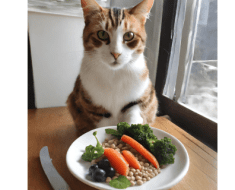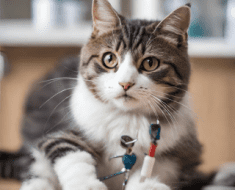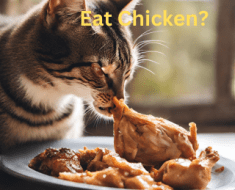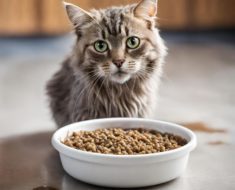A healthy diet for cats includes high-quality proteins, essential fatty acids, and balanced nutrition. Cats require a diet that closely mimics their natural carnivorous diet to maintain overall health and prevent common feline health issues.
Introducing your feline friend to a well-balanced diet is crucial for their wellbeing. Providing the right combination of nutrients ensures they receive the essential protein, vitamins, and minerals necessary for their overall health. Cats are obligate carnivores, meaning they rely heavily on animal tissues for sustenance.
As such, their diet should primarily consist of high-quality proteins, such as meat or fish, to promote proper growth, muscle development, and maintenance. However, it’s equally important to consider the balance of essential fatty acids, as well as other essential vitamins and minerals, to support their immune system, skin and coat health, and digestion. Offering appropriate and balanced meals will contribute to a healthy and happy life for your feline companion.
The Importance Of A Healthy Diet For Cats
Maintaining a
healthy diet for cats is of utmost importance to their overall well-being. Cats have unique
nutritional needs that must be met to promote good health. A balanced diet plays a crucial role in
feline health and can directly impact their quality of life. It is essential to provide cats with the right combination of
essential nutrients to support their growth and development. This includes a proper balance of proteins, fats, carbohydrates, vitamins, and minerals.
Feeding a high-quality commercial cat food that meets these requirements is usually recommended by veterinarians. Additionally, it is important to avoid
overfeeding and to provide fresh water at all times. By understanding and meeting the
nutritional needs of cats, owners can help ensure their beloved feline companions lead long, healthy lives.
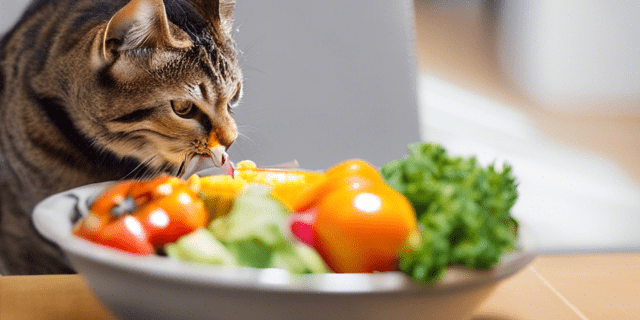
Key Nutrients For Cats
Protein is a key nutrient for cats, essential for their overall health and well-being. Cats require a higher amount of protein compared to other animals due to their unique metabolism. Taurine is one such essential amino acid that is vital for cats as they cannot produce it on their own. It plays a crucial role in maintaining proper heart and eye function.
Fats and fatty acids are another important component of a healthy diet for cats. They provide energy and support various bodily functions. Omega-3 and omega-6 fatty acids are particularly important for promoting healthy skin and a shiny coat.
In addition to protein and fats, cats also require a balance of vitamins and minerals in their diet. These nutrients help support their immune system, aid in bone health, and promote overall growth and development. Some essential vitamins for cats include vitamin A, vitamin D, and vitamin E, while minerals like calcium, phosphorus, and iron are also crucial.
Choosing The Right Cat Food
Reading Cat Food Labels: Before choosing cat food, carefully read the labels to ensure it contains essential nutrients. Look for terms like “complete and balanced” to ensure it meets the necessary standards.
Understanding Ingredient Lists: Pay attention to the first few ingredients listed, as they are the most prominent in the product.
High-quality proteins like chicken, turkey, or fish should be the main ingredients.
Wet vs. Dry Food: Wet food provides
hydration while
dry food is good for
dental health. Consider your cat’s
preference and
health needs when deciding between the two.
Consideration of Life Stage: Cats have different nutritional needs based on their
age and activity level. Choose food that is appropriate for your cat’s
life stage such as kitten, adult, or senior.
Feeding Practices For Cats
A cat’s
healthy diet involves
proper meal frequency and portion control to maintain their
overall well-being.
It is essential to
ensure that they have access to
fresh, clean water at all times to support
hydration. Feeding treats to cats should be done in
moderation to prevent
unnecessary weight gain and maintain their
nutritional balance.
By following these feeding practices, cat owners can
help their pets stay
healthy and happy.
Special Considerations For Cat Nutrition
Cats require a balanced diet that includes protein, fat, and essential nutrients. Providing a high-quality commercial cat food or a homemade diet that meets feline nutritional needs is crucial for their overall health and well-being. Special considerations for cat nutrition include age, weight, and any existing health conditions, which should be taken into account when determining a healthy diet for cats.
| Special Considerations for Cat Nutrition |
| Weight Management, Food Allergies, Health Conditions, and Dietary Modifications are important for a healthy diet for cats. Monitoring portion sizes and food intake is key to managing your cat’s weight effectively. Identifying and avoiding trigger ingredients can help alleviate food allergies and intolerances. Cats with health conditions may require special diets tailored to their specific needs. |
Frequently Asked Questions On What Is A Healthy Diet For Cats
What Are The Key Components Of A Healthy Cat Diet?
A healthy cat diet should include protein, proper hydration, essential fatty acids, vitamins, and minerals.
How Often Should I Feed My Cat For A Balanced Diet?
Feeding your cat 2-3 times a day with balanced portions helps maintain a healthy weight.
Can I Incorporate Treats Into My Cat’s Diet For Health?
Treats should be given in moderation to maintain a healthy diet and avoid nutritional imbalances.
What Foods Should I Avoid Feeding My Cat For Good Health?
Avoid feeding your cat chocolate, onions, garlic, grapes, and excessive dairy for their well-being.
Is It Important To Consult A Vet Before Changing My Cat’s Diet?
Consulting a vet before changing your cat’s diet ensures a smooth transition and addresses any health concerns.
Conclusion
Maintaining a healthy diet for your cat is essential for their overall well-being. By prioritizing high-quality protein, adequate hydration, and a balanced mix of nutrients, you can ensure that your feline friend stays healthy and happy. Remember to consult with your veterinarian for personalized dietary recommendations for your individual pet.
With these principles in mind, your cat can thrive on a nutritious diet tailored to their specific needs.

